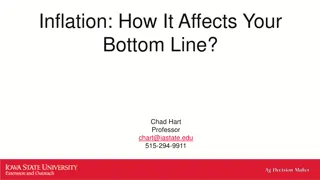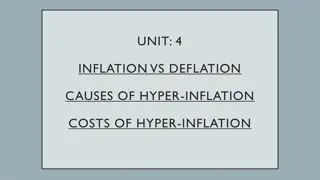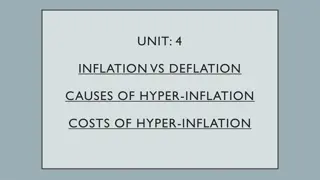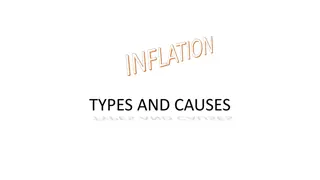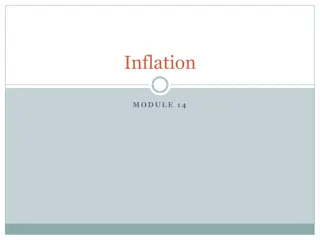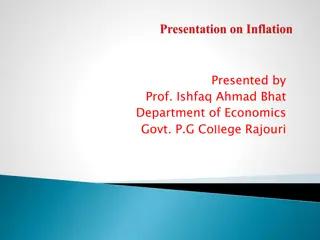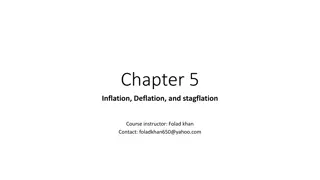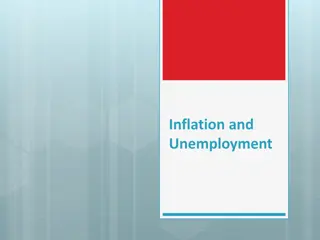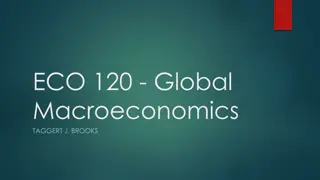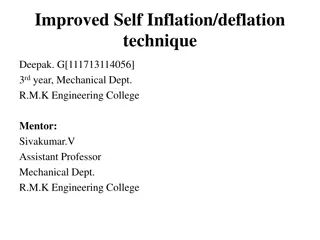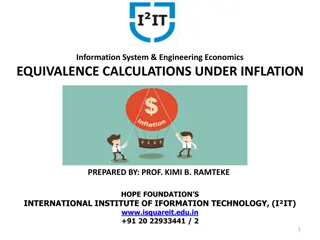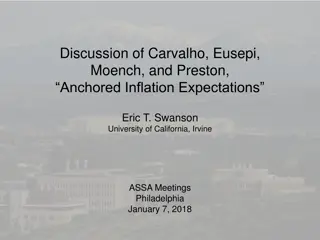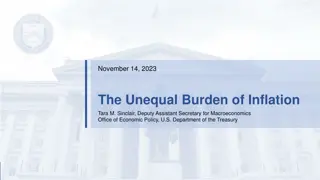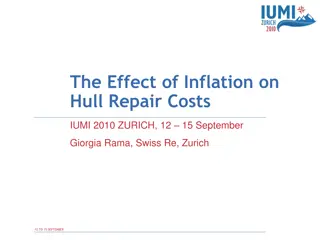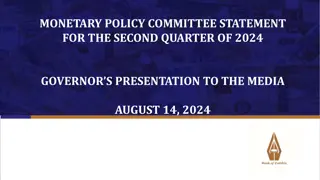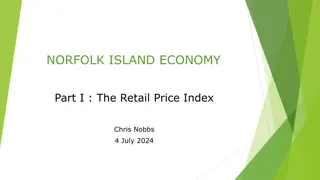Understanding Inflation and Its Impact on Personal Finances
Inflation is a measure of the change in the purchasing power of money over time. This section explores how inflation affects individuals' finances through a practical example involving salary, expenses, rent, and food costs. By investigating these scenarios, learners can grasp the significance of inflation rates in managing personal finances effectively.
Download Presentation

Please find below an Image/Link to download the presentation.
The content on the website is provided AS IS for your information and personal use only. It may not be sold, licensed, or shared on other websites without obtaining consent from the author. Download presentation by click this link. If you encounter any issues during the download, it is possible that the publisher has removed the file from their server.
E N D
Presentation Transcript
TOPIC 3: FINANCE Section 3.8: Inflation
The following sections will be covered: 3.1. Financial documents 3.2. Tariff system 3.3. Income, Expenditure, Profit/ Loss, Income-and expenditure statements and budgets 3.4. Cost price and Selling price 3.5. Break-even-analysis 3.6. Interest 3.7. Banking 3.8. Inflation 3.9. Taxation (VAT and UIF) 3.10. Exchange
In this section, learners will be able to: Investigate changes in the prices of goods and/or services in order to recognize that: - inflation is a measure of the change in the purchasing power of money over time - inflation represents the average increase in the prices of a variety of goods and services over time and that different items can have different inflation rates
Inflation is a measure of purchasing power of money over time. Purchasing power tells you the relative value of money in one year compared to another year, as a percentage. Inflation rates are given as percentages. Inflation is given as a percentage increase per annum.
In 2010 Hilda earned a salary of R5 500 per month. Her total expenses were R4 000 per month. In 2011 her expenses increased by the rate of inflation which was 5,3%. She did not receive a salary increase.
If Hilda paid R1 200 for rent in 2010 and her rent increased at the rate of inflation, what will she pay for the rent in 2011? Hilda s food expenses did not increase at the rate of inflation. Her food cost her R900 in August 2010 and increased by 9% in 2011. what did she spend on food in August 2011? What did Hilda s monthly expenses per month increased to in 2011? How much money could Hilda save per month in 2010? How much money could Hilda save per month in 2011? What effect does inflation have on a person s ability to save if their salary does not increase at the rate of inflation? 1. 2. 3. 4. 5. 6.
1. Rent amount after 5,3% increase = 105,3 100 ?1 200 = R1 263,60 2. Cost of food after 9% increase =109 100 ?900 = ?981,00 3. Monthly expenses in 2011 =105,3 100 ?4 000 = ?4 212,00 4. Possible Savings in 2010 = R5 500 R4 000 = R1 500 5. Possible Savings in 2011 = R5 500 R4 212 = R1 288 6. The amount saved will decrease, to keep the savings the same they will need to find ways to decrease expenses.
Example 2 Rando used to pay R12 for transport to get to work. Two years later she pays R18 to travel the same distance.
Example 2 cont. 1. What happened to the cost of Rando s transport over the two-year period? 2. By how much did Rando s daily transport costs change over two years? 3. calculate the percentage change in Rando s daily transport costs over two years.
Solutions Example 2 It increased 1. R18 R12 = R6 increase 2. % change =??? ?????? ???????? ?????? ???????? ?????? 100 3. 1 =18 12 12 100 1 = 50% increase
Last year Susi spent R500 on the catering of her family birthday dinner. It was such a success that she decided to make exactly the same meal this year but to serve it to her favourite friends. She went to the supermarket and bought the same ingredients, but was surprised to have to pay R535 this time
What percentage increase did she pay on the Ingredients? A. 2% B. 5% C. 7% D. 9%
If the CPI inflation measure for that year was 6%, how did the goods she bought increase in relation to this measure? The CPI rate decreased The goods she bought increased by 1% more than the average CPI rate for the year Inflation was very bad Nothing did transpire A. B. C. D.
What is the purchasing power of R500 after 6% inflation for one year? A. 100% 98% 12% B. C. D. 93%
The average inflation rates for the period of 2006 to 2010 are shown in the table. Year 2006 2007 2008 2009 2010 Average rate of inflation 5% 6,5% 11,3% 7,2% 4,5% Cost of a loaf bread (R) 4,34 4,56 4,85 5,40 5,79 Cost of taxi trip to work (R) 5,00 5,25 5,59 6,22 6,97
During which year was the rate of inflation the highest? 2008 A. 2006 B. 2009 C. 2007 D.
One thing that may have influenced the cost of a taxi trip increasing so dramatically in 2008 is expensive taxi cost price A. petrol increases B. Inflation C. driving D.
Bongi looked at the table and said If the inflation rate went down in 2010 then things would be cheaper in 2010 than in 2009 . Do you agree with HER? Explain. Yes, only if the inflation rate was negative A. No, only if the inflation rate was negative B. No, only if the inflation rate was positive C. Yes, only if the inflation rate was negative D.
Zuko works at the bank. He earns R8 000 per month and his average monthly expenses in January 2010 are as follows: January 2010 Expense Amount Rent R2 500 Food R1 900 Medical R800 Transport R600 Entertainment R1 000
How much are Zukos average monthly expenses in 2010? A. R6 800 B. R6 890 C. R5 600 D. R 6 700
How much money can Zuko save per month in 2010? R570,50 A. R550,50 B. R1 300 C. R1 200 D.
Zukos boss gives him a slary increase of in 2011. The expenses increased by 10%, 4,5%, 4,5%, 7,7% and 4,5%. How much will Zuko be able to save each month in 2011? A. R 5 000 R8 700 B. R1 137,30 C. D. R7 622,70
Zukos salary increase is higher than the rate of inflation. Why is he not able to save as much as he did in 2010? His rent and transport have risen above the inflation rate A. His transport and medical were discounted B. His food had expired C. His entertainment went missing D.
C B D A B B A D C 1. 2. 3. 4. 5. 6. 7. 8. 9. 10. A



